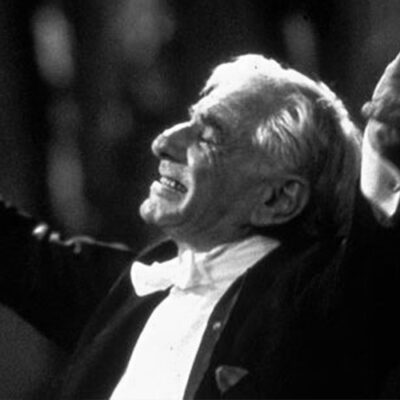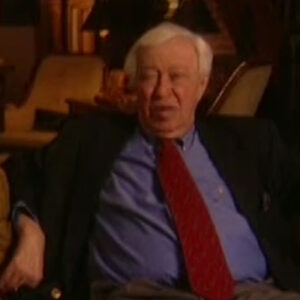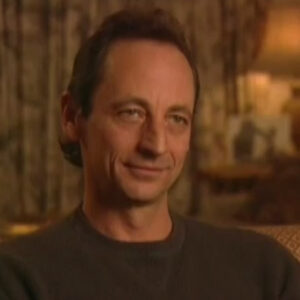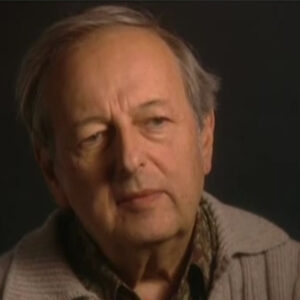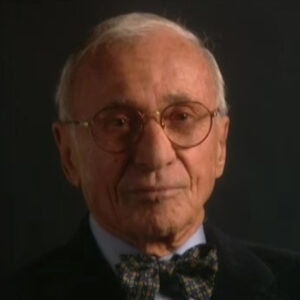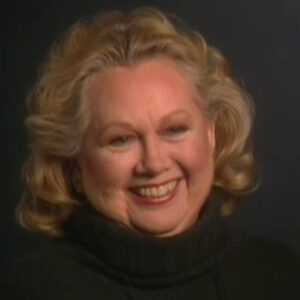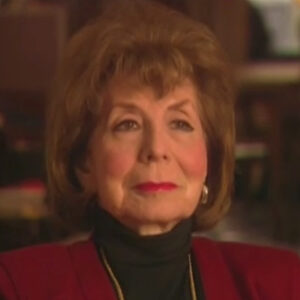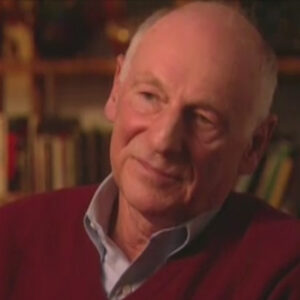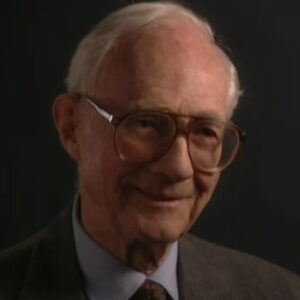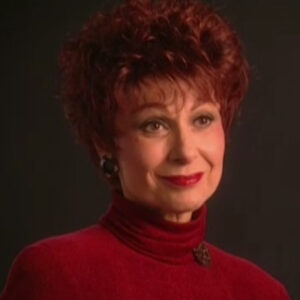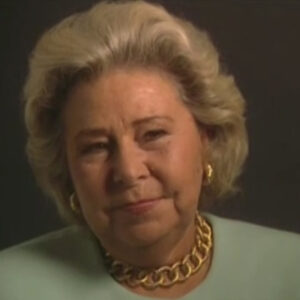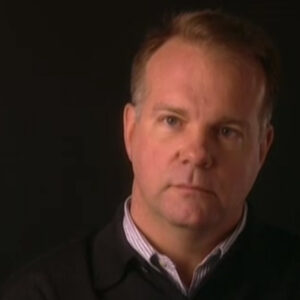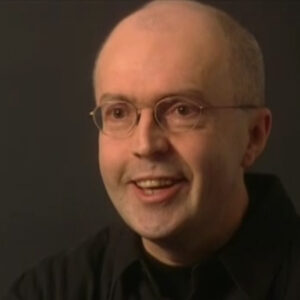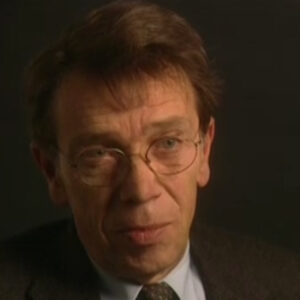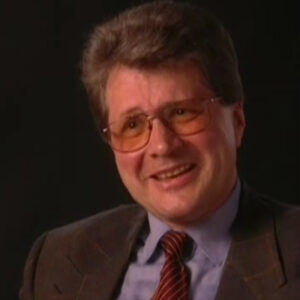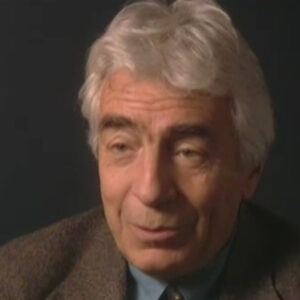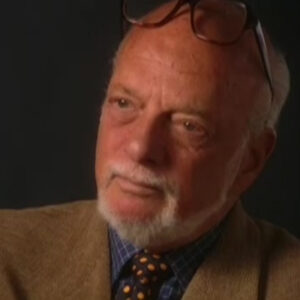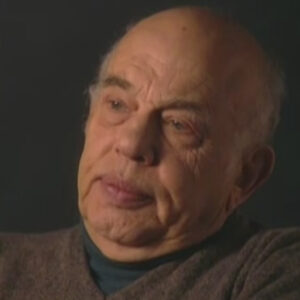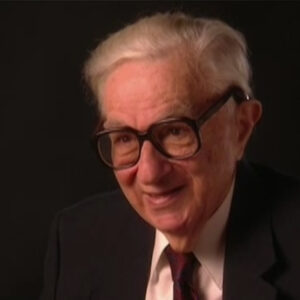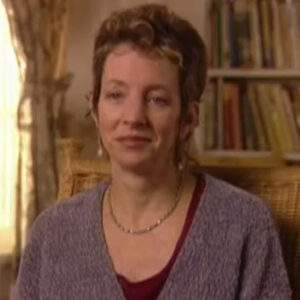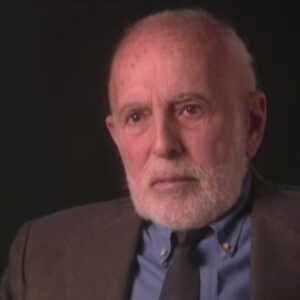Speaker Primarily, I’m a composer, and Mr. Bernstein hired me to become his assistant when he became music director of the New York Philharmonic. Obviously, he needed a go between a valet, a gofer and amanuensis. He had a fantastic secretary, but this was a position that was needed in terms of the orchestra itself. As a matter of fact, when I began, I was on a half salary with the orchestra and with Bernstine.
Speaker And you did that for a while, but then really you became the first charged with music, right?
Speaker Well, it started off as a glorified gopher and gradually started to write program notes of his works, which I adore passionately and got to know intimately because I worked with him very closely on many of his works. And that led to be my becoming an editor. So his early books, the first three were edited by me. And that was a very involved but most interesting process. And you have written about every single one of these almost to some of the theater works, have not required program notes per say, but I would say so. Yeah, I’ve read most of.
Speaker Yeah, so we’ll be able to do all that, but you talked in one of your Das.
Speaker I thought you did it wonderfully where you talked about letting all the plays work, showing great concern for the unrest and the.
Speaker Could you say that to me, please? What I said to you and give me examples, I think one of Bernstein’s quest was one for a search for faith and a century of unrest or a century of lack of faith or faithlessness. I think it was a very religiously minded person. Now, that’s a loaded word, by which I mean he was very spiritual. Now that, again, can be misinterpreted. He was not an observant Jew, however, he was very Jewishly minded, which means he was imbued with a heritage from his father and and from his education and from book learning. But he was not specifically interested in organized religion. I mean, he was as many American Jews are of once a year kind of synagogue goers for the high holy days, that kind of thing. But certainly Passover was important in his family and some of the minor holidays, less so. But what’s fascinating, I know of no other composer in history who devoted so much of his output to music that had Jewish themes. So there were close to 20 works that concern Jewish themes on whatever level, from the smallest to the largest or maybe the closest that we have to that is the music of Ernest Bloch. There is no other composer who is unabashedly Jewish in his works, and this has filtered down into works that are not specifically Jewish, and that’s what’s really fascinating. I think it also has to do with his manner of communicating music, which was very rabbinical. He had this incredible need to teach until at times it just got out of hand, really could be a pain in the neck. But it was extraordinary, his knowledge and his insights and his ability to draw upon his own reading. I don’t know where he found the time to do all the reading that he did. He seemed to know every book. The latest book that came out in his library was floor to ceiling of every dictionary or reference book. Foreign language, etymology, what have you.
Speaker He was intoxicated by words, he just got drunk on them.
Speaker You can’t very well be talking, although he did that on his television videos, talking over music all the time. And he tried to talk to audiences to the famous Thursday evening previews, which went on for a while and then sort of dissipated on. But this need to communicate has to do with, I think, a rather selfish need on his part, which is to get lost in the music. Sometimes it worked, sometimes it didn’t. And I think in the early days when critics pounced on him for his acrobatics or choreography or leaping in the air or wiggling his rear end or what have you, they thought it was a show off kind of thing. I think not. I think what he was trying to do was to induce a kind of state of ecstasy to get into some kind of a trance. It’s something very much like cantorial singing, which is improvisation and being spurred on by the religious moment and and really feeling this deep in your bones. I mean, there’s a psalm saying all my bones shall exalt in the Lord. And I think that is.
Speaker A genuine need on Leonard Bernstein’s part to exalt in the Lord of.
Speaker So it’s something like, I imagine what a holy roller or a whirling dervish or even Ella Fitzgerald doing scat singing, something that occurs at the spur of the moment where you are out of body.
Speaker And.
Speaker And you’re letting the music give you a high and a spiritual uplift to some kind of state of ecstasy, now, as I say, it didn’t always work. Ah. But when it did, I remember, for example, when it came off once from doing the Czajkowski Apophatic, the Sixth Symphony, it came off exhausted and really looked ashen and and pale and drained. And he said I was almost on the brink. So I’m not sure what he meant by that, but was some kind of deep chasm, which is sort of between two worlds of.
Speaker In Hasidic.
Speaker Of spirituality, there’s something called debate cut, which is a kind of cosmic glue where you identify with a higher level. Now you can call God or divinity or whatever you want to call it. But I think that was always his driving goal. And I think he needed that to get this this feeling of joy, this feeling of of complete communication with his audience, this feeling of his need to teach, to communicate. But in a way, it was quite selfish because I want to get my.
Speaker My fun. My need to enjoy myself. To the highest limit that is possible. You were worried about your.
Speaker Oh, good, we can always use that. I don’t know if I answered your question, you answered a different question.
Speaker Yeah. That would have come that we’ve come to expect. I was thinking, particularly in that question. Give me some examples of how his work dealt with the unrest. OK.
Speaker Violence right in the waterfront. Ah, you know, contemporary Rosies story, that’s there was one specific way he would address the unrest of the 20th century, the age of anxiety. And that has to do with his treatment of 12 tone manipulations or music. Whatever you however you want to describe it, Dode Khalfani is a fancy word. Bernstein himself was not a fan of Schaumberg or Burn, and he was more of a fan of album Burke and he did a play, more of album of those three major composers than any of the others because it was more back, was more romantic, more passionate in a way, less mathematical, less dry bones about the whole thing. However, he would use 12 tone techniques. And I don’t want to get too analytical about this to describe this unrest, so, for example. And the Scottish Symphony, there’s a 12 tone row that through various manipulations, blossoms into a tonal tune that sounds something like Appalachian Spring of Aaron Copland, but it’s not a lift of any kind. It’s a logical, evolved evolution from those 12 tones. And he always passionately believed in tonality. That was Mother Earth. That was the rootedness of everything. So he would use, for example, to express boredom and candied. There’s a wonderful number called Quiet Ah, which starts off with the 12 Tomaro meaning and it’s stated in its first form. And then it’s a reverse form, the retrograde, and then it’s upside down form the inversion to show boredom with this kind of dry bones academic approach. It was his joke. And of course. Some musicians in the in the school, so to speak, would not take too kindly to that, but his way of making a joke and at the same time expressing ennui. There are other 12 tone moments in the age of anxiety. There’s something called the dirge, which is to show sadness, which is show heaviness, which is show the weight of history, if you will. And that’s when he uses this kind of material. Anything to do with.
Speaker Heavy. Depressing, sad.
Speaker If you will, the violent moments could have been expressed by him in that way, but it was always towards it was a struggle to then be resolved through tonality. One of the definitions in music of dissonance is something that is left hanging, that needs resolution. Now, those things that are called dissonant in the 19th century would be considered consonant and the 20th century and now in 20th century, any anything goes. And depending upon the context, something is dissonant. But that same thing in another context is not dissonant. So it depends upon how it was used. And he was very deliberate about that.
Speaker So that is one way. I mean, his major symphonies dealt with the search for faith. All three of them. In one way or another.
Speaker The Jeremiah Symphony was written in response to the early news of the Nazi atrocities. It was in 1942, I believe, Age of Anxiety, which is based on the poem by W.H. Auden, has a really incredible hidden. Jewish agenda.
Speaker At the end, I just discovered this on reading the poem, I didn’t realize at the end of the poem, Auden uses the monotheistic creed of Judaism, Schmeiser 11, Alienware and I could behold, oh, Israel, the Lord, our God, the Lord is one. Well, in his search in the age of anxiety, Bernstine doesn’t of music, a musical equivalent of the Lord’s or the divinities name. And it’s too technical to get into it right now. But but there is a kind of transcription of the Hebrew letters into musical intervals that are specifically that they have to do with the interval of the fourth. I won’t get into it right now, but. When I pointed this out to him, yes, he agreed with it and he was quite amazed at himself. In other words, he was so imbued with this that even in his so-called Catholic peace mass, there are so many Jewish moments that you can’t be amazed at it in West Side Story. The very opening and I’m not the first to note this is a shofar call that I don’t Bharata well. It might have been a kind of in-joke to begin with, but in his last major work, Concerto for Orchestra. The very last sound of the first movement is called Jubilee Games and ends with that that are part of that rhythm, but every member of the orchestra playing any note they want. So not everybody gets that, but the whole movement is based on shofar, cause that is the ram’s horn, that is the call to judgment on Rosh Hashanah, the high holy days. Even in candied, there is a shofar call when they are in Lisbon and the archbishop comes in and the chief rabbi, which again is sort of caricatures there, they are called to arms, so to speak, with the shofar call. So there are all kinds of things going on all the time in. On the town. There’s the great tune you got me, baby, you got me. Well. I don’t have the Hebrew in front of me right now, but there is a cancellation phrase, that is when you chant words from the Bible that goes Gerada da da da da da.
Speaker And then later on it goes, you got my whole family in Peoria and in the Hebrew calculation’s da da da da da da da da.
Speaker It I don’t think it’s conscious on his part, but this comes from his conditioning and the way he was raised and what he heard. He says, as a matter of fact, that I think was in nineteen twenty six, the first sound that he could remember when he was in Temple Michigan to fill its first the first building in Massachusetts. I forget exactly where it was. I know the second one went to Chestnut Hill or something like that, that when he heard the organ in the choir and what what have you, something stirred with within him that made him believe that music was his reason for being. Now, what was he maybe in his early teens then? 1926 or 1980? Yeah, so. Lenny talked at one time. You can talk about this. No, I don’t think you think about it. But let me talk about. The exact quote, but the fact that he came rushing back around. He felt that there was some kind of just basic DNA that made him respond Russian Jews. She is the first piece you wrote you work with the Russians and the gypsies, supposedly a youthful piano concerto, there were few pages of that extant somewhere you. Youthful bombast, but can you talk about that, because I don’t have many saying that I only have it from a letter or an essay or what the how the Russian not just the tuition, the Russian, but you see the the the musical quotient from Russia is Jewish. That is the Irving Berlin’s of the world. And others who became the masters of pop music in this country come from a Russian background. And a lot of the so-called popular tunes in Russia were written by Jews. There’s a man named Dimitri Epocrates, for example, who I think wrote, and I may be wrong about this Meadowlands, Meadowlands and so forth. Is Jewish, so that’s a tough nut to try to slice between the Russian and the the the Jewishness of it all, however. What’s interesting about Russia is that music was a way out of the pale of settlement. It was a kind of ticket free ride if you had a talented youngster in your household who then went to Leningrad, the conservatory like Hafitz and Elm and. Oh, I can’t remember who else Spivack ski and you graduated with, especially with honors from that particular school that entitled Your Family. We’re talking about early 20th century to have a permit to travel anywhere in Russia. Otherwise, if he were just a poor schlub, a tailor or a cobbler or something like that, and you didn’t have that kind of avenue of opportunity, you were stuck in a particular locality. And and it’s called pale of settlement because people were poles that literally were boundary markers. And you couldn’t move beyond those unless you got occasional permission from the authorities. But with this kind of. Honor bestowed upon you, I mean, through through talent, you and your family were much freer to move around in all of the the Russian country.
Speaker So. Interestingly, there’s a famous story. That Sam Bernstine. Lenny’s father.
Speaker I was very opposed to his son becoming a musician because he equated that with beggars, with gypsies, people roaming from town to town and getting a few kopeks and such when they played at weddings or bar mitzvahs or Purim celebrations or something like that.
Speaker And of course, the joke is and who knows, maybe you’ve heard this many times already.
Speaker Later on, after you become famous, Leonard Bernstein, Sam Bernstein was asked, how could you have ever opposed your son’s being a musician? And sounds Bernstine immortal reply was, how did I know it was going to be Leonard Bernstein? So there’s a lot of opposition like that, I mean, Arthur Schwartz of the famous Schwartz and Deetz team wrote Dancing in the Dark, for example, on his father wanted him to be a lawyer. Eddie Cantor had to fight his father, who was opposed to being a performer because of an Al Jolson. Many of the people had this problem. They still do to this day. But it was particularly poignant with the conflict between the old world and the new world because of this equating musicians with with trash, with the homeless people. Sounds like that wasn’t a the place that you was slightly elevated. If you if you had the talent to go into an area that was not the folk music, but was so-called train serious, whatever label you want to put on it. Great Elm and yeah. No, it was not, and in Rimsky, Korsakov was famous for encouraging his Jewish students to cultivate their Jewishness in their music, their nationalism, but we’re getting off the topic here. Well, that brought up you. What? What?
Speaker Oh, there’s no question about that.
Speaker He was very much his father’s son.
Speaker And at one time, I’m told that Leonard Bernstein was flirting with the idea of becoming a rabbi himself. I’m sure it was a very quick flirtation. But still, the essence of that just carries over into all his work and talk about work. He was exhausting. Some people who would be finishing a day, he would just be beginning, there was more than one occasion where.
Speaker At 7:00 p.m., people are sitting down to dinner. Leonard Bernstein was sitting down to breakfast and that meant you were up all night to work his day with him. That did cause some problems.
Speaker Well, your metabolism wasn’t in the same groove and you were drooping come two o’clock in the morning and he was just his engine was just revving up, then that means the engine was running up.
Speaker What was it, man? Enthusiasm, I suppose, more cigarettes in the tray of.
Speaker The the jokes were flying left and right and in the middle of all that, the notes were flying, too. On the paper, the the talk got more and more intense. Often would digress like some gigantic tree branches all over the place. Talk about verbal people, valuable people, this man never stopped talking and of course, you learned a great deal, but not at 2:00, 3:00 in the morning. It got a little difficult. Ah.
Speaker Don’t ask me to get into technical things, but it was also where he unburdened himself and, you know, got into more personal things and about his life and his feelings about people and so forth.
Speaker Without getting specific. Yes. What were the broad term?
Speaker In terms of his creative life. This is not a revelation of any kind, he really did not want to be known as the man who wrote West Side Story and that exclusively. Of course, he was very proud of that achievement, and almost any other composer would be happy to have just that one credit are.
Speaker He. Resented being compared to Gershwin. Because he felt he was an educated, trained, highly literate musician, combined with an innate talent of extraordinary dimensions and passion, and that that Gershwin was in comparison. I wouldn’t say on the other side of the tracks, but didn’t have the same kind of erudition.
Speaker And yet Gershwin, in many ways, because of his lack of erudition, probably was more spontaneous. I think the one of the. Goals of Bernsten as composer was the need to do to show in his music controlled spontaneity. Now, that’s a paradox. It’s very interesting.
Speaker How can you show something that seems to be written on the spur of the moment and yet has to be thought out and carefully and written down?
Speaker So, for example, there’s a wonderful, wonderful piece called Perello Fugue and Riffs. It’s about a nine minute piece for so-called Jaspan written for Woody Herman. It’s one of the few pieces I know where you have a sense of a jam session, but it’s all carefully thought out. So how do you get the sense of of it happening right then and there at that moment? And still writing a fugue of all things is one of the most intellectual pursuits that one could have in composition are in the Carders Symphony. There’s a choral cadenza where this happens at right at the end of the second movement. There’s been a lot of turmoil, a lot of noise is going on. And he has all the chorus in about I think it’s split into eight different parts, singing spontaneously, different music altogether. It’s like a snake pit. People are writhing around and what have you. It does show, again, the turmoil of the unrest that that piece was written in the in the days when we were totally in fear of nuclear energy. And the explosion was the story was extraordinary. They were really good friends there in the.
Speaker Many could not accept that he had grown up here. This is very interesting. Treating him like a little kid, the young the new kid on the block. I was 11. He was in. OK, are we on just what we just got out of?
Speaker Interestingly, I think.
Speaker If there is a fatal flaw, it was Leonard Bernstein’s need to recapture his youth, no matter how old he was. So his miracle year was in 1943, fancy free on the town, Jeremiah, the New York Philharmonic, whatever you are. He his energy was extraordinary and his physicality, I mean, who’s a barrel chested guy? He was a I don’t know. Most people know was he? He was a sportsman. He was a swimmer and a tennis player in squash and horseback riding and water skiing. He he was vigorous. He enjoyed that kind of activity and especially the competitive aspect of it.
Speaker I’m not talking about football or basketball or anything like that anyhow.
Speaker His first symphony was written within a month’s time, it seems at least two of the movements, the last movement dates from 1939. We’re talking this now four or five years later, he was submitted for a contest in Boston. Well, he was up all night long, I think, with a sister and some other people lining the paper and getting this all done. And he got it in under the deadline. I think he really. Felt he could coast on that for the rest of his life and but his body wasn’t cooperating, so we were in Washington at the Watergate for a week or so. I think it was the premiere of songfest. So we’re now talking in the 1980s or late 70s and. He decided that week that we were going to create or he was going to create, I should say, an overture in honor of Slava Rostropovich called Slava. Literally, in one week’s time, we sat up all night in the Watergate Hotel and this was a recycling of a number from the ill fated everybody uses that adjective ill fated show. Sixteen hundred Pennsylvania Avenue, which has incredible music in it, by the way. So but this had to be reconceive for a symphony orchestra. Well, I mean, that was rough going. But there was some kind of body language or memory that said, I did this before, I can do it again. And.
Speaker I think that’s part of the.
Speaker Problem of the later works, which for some people are not as successful as the earlier ones because.
Speaker Not enough proportionate time was spent on them, should have been in terms of the the physicality, in terms of the the need to spend more time on it. He could I would. I think it’s a little flip to say he could dash things off, but he was on the run. Age of Anxiety is famous for this. And he talks about it written in airports and waiting rooms, in hotels and in between engagements and what have you that could not continue forever.
Speaker Interestingly, though. This last piece, big piece that is not really very well known, called Concerto for Orchestra, which when we were I was working on it with him the first time when it came out, I thought, oh, shall we say it was a problematic piece.
Speaker I didn’t think it succeeded. I just recently listened to it again and I was bowled over. I couldn’t believe how original this is, the whole first movement is just based on improvisation and the orchestra picks whatever the notes they want under certain guidelines, a roadmap that the composer gives them instructions. That’s nothing new. I mean, it’s been done by other composers, but this comes out with a whopping, Wolf. You know, it’s just such a joyous thing to hear. And I was amazed at that. And I was pleased, but I needed to get away from it. I needed a perspective.
Speaker When you say that later works, people.
Speaker It’s not quite a success spreading from what I would say after Chichester Psalms.
Speaker There is one incredible work called Debark that is really not very well known. I think it’s going to be revived this summer, as a matter of fact, in Lincoln Center. First of all, there’s a Bernstine festival, the summer of. I think it is a really a jewel in his crown, an amazing work of perhaps it’s too ethnic and doesn’t have enough crossover appeal for the American listening audience.
Speaker I don’t know. Perhaps it’s too specific about it’s a. A Jewish story and a Jewish idioms that are really incorporated into it, songfest is an amazing work each.
Speaker I was a 12 songs trio, solos, duets 13. Yeah, that’s right. Each in themselves. I’m not so convinced that it works as a totality.
Speaker Ah, maybe the. Those songs should be heard individually and some of them have been recorded that way to Halil.
Speaker Is based on music from book, I don’t think anybody really knows that from a segment called David and Jonathan and David and from music recycled for CBS, the fiftieth anniversary. I don’t think Leonard Bernstein would be very happy for me to be talking about this. I think he would have preferred that it would, you know, sort of sprang full from his head, but it just didn’t work out that way all the time. As a matter of fact, some Chichester Psalms music is rejected. Music from West Side Story. This is nothing unusual among composers. I mean, this goes on all the time. That’s what I’ve always heard.
Speaker Yeah, the other. But but you see, the point is that for some people, it doesn’t have that kind of swagger and.
Speaker In your face kind of impact the fancy four years or on the town, that youthful energy type thing, and that’s why I don’t think it is, at least right now, as well known to the American public, quiet place as another.
Speaker Complicated.
Speaker I wouldn’t call it a bowl of worms, but let’s say a bowl of cherries. Of. The problem in that work is that it’s basically a chamber piece for four singers, but it uses a gargantuan orchestra. And I don’t think the two mix very well, I think that’s one of its problems, I think also personally that incorporating troubled Tahiti into that particular opera was an error in judgment. But that’s one man’s opinion because they’re so totally different from each other. One is quite intense. The other sort of a cartoon.
Speaker So, I mean, those are specific pieces, they all have problems, but they all have glorious music in them. I agree with that.
Speaker I think it’s actually celebrity justice. Oh, that’s true, true, Massie’s is like a songfest and that each specific moment is glorious.
Speaker But parts of it don’t add up.
Speaker I think some people feel that it’s too dated and too with the 1960s and the flower generation and hip and peace brother and pass it along and that sort of thing are. When it’s good, it’s very, very good and it gets your blood running and that towards the end, the mad scene, the owners day in leading into the celebrants mad scene is just spine tingling. It’s great theater experience, not that I’ve experienced it, I would say that people describe it as.
Speaker Really? Yes, well, there is the video, of course. Yeah, yeah, yeah, you know, situation.
Speaker But that’s another manifestation of a Bernstine spirituality. Obviously it is. What do you think, Lenny? Besides Westridge, problems with identifying players, which were probably all his problem children.
Speaker Like daybook and a quiet place, I know he was very disappointed in the reception, the quiet place, but it is a flawed work. It doesn’t work on every level. He’s prouder than he was in. Oh, I wouldn’t say so. Which words do you think so? I think I think one of his favorite pieces were fuckin riffs.
Speaker He spent a great deal of blood, sweat and tears and had a lot of agonizing and low and behold. Woody Herman didn’t perform. And I think its first performance came some years later on the world of jazz and omnibus with with Benny Goodman.
Speaker That’s definitely a favorite child. Benny Goodman is.
Speaker Yeah, yeah, right. And you come back and he was he was he was, as far as I recall. And I just you have to talk to me just a little bit of an age, OK? Because I don’t have enough. It turns out to be based on the iPhone, but there’s more to this than that.
Speaker Well, at the risk of repeating myself. The last. Part of Auden’s poem.
Speaker States in transliterated letters, the Hebrew monotheistic creed of Chemaly, Israel and L.A. Adnani Accord, behold, Israel ahero Israel, the Lord, our God, the Lord is one. We then go into something called the epilogue remembers the age of anxiety and the search for faith. But what is faith mean faith in your fellow human being, faith in a glass of orange juice in some kind of divine force? What is it exactly? And I think Bernstein’s answer is specifically a Jewish view of of the world.
Speaker So we hear two intervals of the fourth da da da da da da da da da da ba ba dum.
Speaker So the first one is that that’s a fourth da da is another fourth. So we now have two intervals of the fourth which.
Speaker In. Written terms would be called a very fancy Greek word, Tetragrammaton, Orgasmatron, and I have I don’t have my dictionary in front of me. This is the four. Part. Analogue of. Jewish expression of of the divine force, which is good. Hey, Vav, Hey Jude Haven. He became Jehovah. When you put in the vows in between, you’d have to pay. So. He announces it in a certain way, it’s after an incredible jazzy riff called The Mask, a lot of tinkling and jangling music going on and that fades into the background. And we hear a trumpet come in with this theme, serene and quiet and sort of benign and looking over all this anxiety, this jangling what’s going on in the world, saying, I am your answer.
Speaker Here I am he Naimi, as we say in Hebrew.
Speaker Ah, which was the expression with Abraham and the getting caught with the ram’s horn in the bush and the sacrifice of his son Isaac and so forth, you know, and here I am. And that expression of those two intervals of the fourth is the musical equivalent of Ordenes Schmeiser Adnani. No, I don’t. I mean, Adnani is the code word for Jehova. Orthodox Jews do not express the name of the Lord, but but use a substitute word of some kind. I don’t share I don’t know what have you because it’s an ineffable name and cannot be pronounced. To holy territory, not to be trod upon.
Speaker So as I said, when I. Sort of uncovered this I’m I’m pleased it was a discovery of mine, Leonard Bernstein agreed with me. Yes, indeed. That is there. That’s the symbolism there. And indeed, the search for faith in this particular symphony, which has to do with the 20th century, is for him. At least a Jewish answer. The candied sweet. Yes.
Speaker Globe-Trotting Globe-Trotting wrote that he had the chance to try out all these different styles, but I read that. You say that again, talk about different styles. Well.
Speaker I’m trying to remember. Yes, it’s called a schottische bon voyage, bon voyage. I understand very well that this is has a Scottish rhythm of a certain kind. I’m easily assimilated as a tango, as I mentioned before, quiet, which is an exercise in 12 tone music, brainy music. Pass it along is a kind of.
Speaker Italian OMGPOP paywalls of some kind. So we now have Spain, we have Scotland, we have Italy, we have something international called 12 tone.
Speaker We have general Americanized kind of music in the opening number, the best of all possible worlds. There are takeoffs on Protestant crowds. In fact, there’s a little quote from Ein Furstenburg of Martin Luther King. I talked about the shofar calls before the Jewishness. Oh, gosh. I’m trying to remember some of the other. Oh, of course, the glitter and be gay is a takeoff on Guno, the jewel song of opera Arias. So it’s a mélange of national styles as well as the history of music. There are other examples that have left out the major influence. Well, often people say Copeland, and there’s no question about that, but what they don’t say is that Copeland was also influenced by Brounstein.
Speaker There’s a. Peace. They Copeland wrote the score for Was it, oh, a Carol Baker film about. I can’t remember the name of the film, in any case, he or she is a victim in a city somewhere. I can’t remember it’s not funny, anyhow, he refashioned this music for the city of London as some kind of big anniversary called Music for a great city. Well, if you listen to the first movement of that and this is written after West Side Story, you would swear that the subway rides and the drums that were going on in that particular movement come out of a West Side story mentality.
Speaker And I think very much the Copeland was influenced by that of not many people know that Bernstein wrote or was it Roday or Billy the Kid? I forget which one right now where there is a kind of barroom Western Saloon piano. He wrote that music eight bars or so, and then Copeland expanded on that.
Speaker And of course, the first published piece that Brounstein had was a piano transcription of Copeland Nail Salon, Mexico. This to be like. Which the transcription, I never heard that. No, I think I heard that somewhere, anywhere. It had a range of. Yeah, well, I mean, there are specific things like the clarinet sonata, the opening movement is ascribed to Hindemith, kind of.
Speaker Sound Shostakovich in the Jeremiahs symphony. Yeah, and this whole business about influences is tiresome and fascinating. At the same time I tend to do it myself. I listen to something and I said, oh, that sounds like Debussy or something like that. I think it’s almost unavoidable. And certainly a man who’s conducting all this music is bound to find it somewhere in his own stuff. But but it’s filtered through this kind of osmosis process. And it comes out in this case, of course, strictly Bernstein. What does that mean? It means that this loaded word, eclectic eclecticism. And what does it mean? That Greek word, meaning to gather or to read or to draw in. But when you gather something, it’s that, you know, you’re not doing it indiscriminately. You’re being selective about it with with taste and and in musical terms, you’re not necessarily doing it deliberately. Sure, there are only 12 notes in our Western scale. There are there are more notes and other scales and there are bound to be identities of one kind or another.
Speaker I think Bernstein’s. Supreme need to remain tonal and atonal age, especially in the 50s and 60s in this country, was. A mark of integrity, and I think it’s been proven since then that.
Speaker That when you it’s like the difference between a mixture and a synthesis, if you take various elements and you can still see those things in some kind of porridge or stew, it’s a mixture. But if they blend in, become something else. This is a synthesis. And I think definitely Burnstone becomes a synthesis. So we have the Jewish element. We have the Latin American element. We have the jazz element, just general big city sound. All this comes out specifically a kind of Bernstine sound. I don’t think that is recognized enough and enough credit is given to the man of.
Speaker I think, though, as the years go by, it’ll be proven to be the case.
Speaker You know, I when I was in college. I always wondered what it would be like to know Mendleson list, Mahler and Gershwin. Well, I found out Bernstine was all of those, he was Mendleson because he had this youthful ardor and had great accomplishment when he was young, he was listed because he was a glamour puss and he had these this need this affinity for spirituality, which list wanted to become a monk and his later life.
Speaker Möller, with all his dualities, the conflict between his Jewishness and his need to take up Catholicism and his brooding and his gargantuan capacities and Gershwin for the obvious reasons, and not only the Americana Americana aspect of it, but because of this blending need between pop style and so-called serious music.
Speaker I wish we had better labels than that, but Leonard Bernstein was all of us and more great. David.
Speaker He was referring to Stravinsky. Oh, no, no question about that.
Speaker That show me where. Bernstine. One of his.
Speaker Hallmark’s is shifting meters so that you’ll have a piece will go from four four, two to four to three or four. But more than that into. Metric meters, like seven, eight and five eight, and one of the most famous examples is three, four and three eight in America.
Speaker Ba ba ba ba ba ba ba ba ba bum bum bum is three, four. Up, up, up, up, up is six, eight, six, eight and three, four. They’re basically mirror images of each other. But in Stravinsky, like in Ristretto sold almost every bar is a different meter.
Speaker It’s always shifting because that was a favorite piece of Linda Bernstein’s as a kid. I mean, he conducted at Tanglewood and the Octet for wind instruments and so forth. Stravinsky reveled in that kind of. Complexity and Bernstine was in his element when he was doing Rite of Spring, for example, so that was one thing. It was not only the shifting meters, but the as the asymmetry of the meters that Bernstine used so effectively and also in slow tempos, like in some of the piano anniversaries, which are not too well known. This goes on.
Speaker So certainly in the rhythm, it’s certainly in the use of percussion and the use of high brass, the use of piano in the orchestra, piano, not as a concerto instrument as a solo instrument, but as a member of the group for its coloristic effects. Very much Bartok does the same thing. Like if, you know, music for percussion, strings and chilliest are these percussive, high ringing sounds which just give a lot of spark and energy and impetus to what’s going on. So those are some specific areas.
Speaker Laziness was another piece of Stravinsky that was important to.
Speaker For George Bush, I tell you, we’re on the same group and I’d like to use a little bit more because I think it would be a visual, right?
Speaker Just walk straight, talk a little bit about. What is the view there?
Speaker I think particularly what do you think, or one of my favorite parts is not in the suite. It’s only in the music is a very poignant. S. I think it’s on the roof between. Marlan and. Every memory of the pigeons cooing what have you. It’s a very haunting refrain, and then we hear it the the love theme. What’s interesting about that love theme is that it’s repetitions within repetitions.
Speaker Da da da da da da da da da da ba ba da da da da ba ba da da.
Speaker So there’s a lot of repetition rhythmically and almost into vertically in that theme, but then the whole thing is repeated over and over again, but each time with a little variation and it builds up passionately. Another curious thing, and that is not noticed by many people is that when they’re in a tavern.
Speaker We hear a jukebox version of that tune, and unless it’s pointed out, you don’t realize that that’s going on.
Speaker Of course, one of the extraordinary moments in that is very at the very beginning with the fugue for three tympani of vying, sort of a competition between the three, I think percussion players just really have a field day with Burnstone. There’s no question about that. They just revel in it, the battery, they call it, and they have all these sounds to draw upon. And Lenny, love that. He also loved trying to find the latest gimmick, sometimes at work, and sometimes it didn’t. So, for example, in Mass, there’s something at that time was called the quadraphonic tape. It opens up with the tape darting around the auditorium, coming from all parts, I think right now is just a conventional stereotype. But at that time, that was it was the latest rage. I don’t think the equipment even exists anymore in Jubilee Games. It tried something. I think it was called the discoverer. I may be wrong about that, where the orchestra spontaneously would be playing their notes and a kind of improvisatory way. And it was immediately recorded and had the capacity to play back immediately so that the machine was playing with the orchestra played earlier and they were sort of accompanying themselves.
Speaker Let me ask you why you think they can do more from the.
Speaker I think Leonard Bernstein had to try everything, everything reasonable and unreasonable, I think he conquered that world and there was no need to continue it. I think it’s a shame. No doubt about it, there were even 24 hours in the day for Leonard Bernstein, you know, just so much that could be done. Of course, you know, there’s that mysterious screen test that nobody seems to know that exists of Leonard Bernstein as Peter Ilyich Tchaikovsky, but I don’t believe it was ever made. All I said was, oh, I see, OK, maybe somebody has it somewhere, it’ll pop up in response.
Speaker On the Waterfront was pretty fantastic that.
Speaker Very why didn’t they win the Academy Award, high and mighty?
Speaker That’s right.
Speaker I mean, there were many critics who said was the best films.
Speaker Could you say that On the Waterfront?
Speaker You know, there are a few movie scores that stand on their own as symphonic pieces. Now, this is not to say that a score by Bernard Herrmann or Max Steiner, which, by the way, these days it’s becoming more and more the rage to record these scores. Robin Hood and what have you can stand on their own symphonic alley that is showing the metamorphosis of a musical motive and its development, its exposition, its recapitulation, its various guises. Copeland, of course, was incredible at this. Prokofiev certainly was. And Alexander Nevsky. And that was that. Ivan the Terrible.
Speaker I mean, there are great scores, the William Walton.
Speaker So Bernstein is certainly not exceptional in this case, but they are few in number. And that On the waterfront, the suite from it symphonic suite, it is called works like gangbusters on its own. You don’t need to follow the scenario to appreciate it. It’s the same thing with symphonic dances from West Side Story. It’s nice to know the star crossed lovers are meeting here and they’re being separated there and the fight happens here and that sort of thing. But I don’t think it would be very interesting to try out both of those pieces, although it’s probably impossible on people who don’t know the actual scenario that’s on the, you know.
Speaker That’s in his background, probably easier to do with On Waterfront’s waterfront.
Speaker Yeah, but because people seem to know. You said a very nice thing.
Speaker That I’m going to say to you, and I’d like you to try to remember to say back to me, OK. It’s from your own right. Yes, but it’s a mess. You said this would be better than the ban because shorter mass is the culmination of a search for lost faith, which was posed by the three. Right. But this seeking is a little less here today, but is directed towards faith in human beings as much as it is in faith. I know, you know.
Speaker Yes, I do. I don’t know how I can elaborate on that. The symphonies these symphonies are a quest for.
Speaker For something to believe in.
Speaker Leonard Bernstein could be embarrassing this way, and he also could be supremely inspirational.
Speaker He was quite extreme.
Speaker The.
Speaker The Scottish Symphony is in response to the to nuclear energy and the threat and how can we live with this? Destruction above us. Age of anxiety is just the general unrest of an industrialized robotic civilization.
Speaker Jeremiah is in response to Holocaust. So.
Speaker We’re talking about in the symphony’s. Specific. Generic. Guiding forces of the 20th century of inhumanity to a people or peoples in the Holocaust, industrialization and the breakdown of individuality, and three, the threat of a mushroom cloud.
Speaker Mass.
Speaker Assumes that all those things. Ah.
Speaker Underlying our humanity and wants to rise above it as if we’re spiraling upwards in a kind of Darwinian effect, that.
Speaker Man, woman.
Speaker Can rise above their lust, their animal instincts, and and achieve some kind of what we say in Hebrew Covena, some kind of glory, some kind of reaching out to the divine impulse of some kind, but on a one to one basis, not on these larger issues. And it’s kind of a private kind of message, whereas the other is much more public.
Speaker I thought you were with Lenny and Felicia in Moscow with Castro.
Speaker Yes, well, I was not privy, though, to that. That search when. They went out in a taxi and she found him in his dark house somewhere in the muddy countryside. I wasn’t even aware that was going on. They kept it very hush hush, I think, of course. And it was it was kind of a dangerous and I’m sure exciting thing to do.
Speaker So.
Speaker I just found out about it like everybody else when he showed up.
Speaker I’m proud to say I have this little bit of that because I have a wonderful picture. Right. And Pasternack, and he’s wonderful. And if you’re telling something, the story that people will never.
Speaker Well, this saint like person. Came into our view with his white hair and his kind eyes, and I think we were all dazzled by him. He seemed like somebody who was beyond an ordinary human being. I think he was looked up to and admired and it was kind of a godlike creature. I was pleased I got his autograph and that’s basically my memory of it. It’s nothing astonishing beyond that. I mean, I have no anecdotes or anything of interest to add to it.
Speaker He alone connected me. Oh, I’m sure of it.
Speaker Why I you there for the dinners in the green room after I was in the green room.
Speaker But I wasn’t there, as I say, in the countryside when they discovered each other. In fact, I just don’t recall even all the details. I’m sorry about that. This is in the same room where my hapless and Skya was an arm, Khachaturian and Moxham Shostakovich, the son of Dmitri. Ah. I mean, it was a very heady atmosphere. Coveleski was there. I do recall Burnstone had a meeting with the Russian Composers Union and and his inimitable way tried to lecture them. I don’t think it went over very well, but that was his style. In fact, we learned after the fact that when he lectured the audience and there is that great film about the I have so many unanswered question and I think Rite of Spring and that Lenny was bringing it back to its Russian soil. It was kind of an arrogant pose. They felt somewhat insulted, but. That was his style. But I do have somewhere of a note that some of the Russian audiences passed up, would you be so kind as to play the question without an answer?
Speaker So that was kind of precious.
Speaker I’m not going to have time in film to deal with at any length with the fact that Lenny Friedman published many books, that he wrote some very important, significant essays, The Negro Music Beginning at Harvard Art belongs to people several. Could you kind of just very succinctly sum up the fact that Lenny was also rather prolific writer and publisher and and some of the kinds of things he was writing about? I talk about the omnibus lectures as joint music, some of these essays in particular, which because it shows a continuing concern about certain issues, as you no doubt know, Leonard Bernstein was intoxicated by words.
Speaker He was a very verbal man. And at times it was verbose.
Speaker But he.
Speaker Had so many insights and some of those insights were. So obvious when they were pointed up, but you didn’t realize it until they were pointed out, he. Was very much a product of Harvard and the Boston Latin School, so I remember. There was a show about genius and madness, and there was a specific scientist from the 19th century whose name escapes me that he drew upon, you couldn’t. You were caught unawares where he would find these areas died or esoteric references of one kind or another, but it was there all the time. He was like a computer, a brain that he probably forgot more than most people know in a lifetime, that kind of a person.
Speaker So. He.
Speaker His love of teaching and of communicating, which at times was very show of manifested itself in his writing and by the way, his handwriting. I would love to see you should see an example of that was exquisite. It was really a beautiful hand and not only in terms of of language, but in terms of this notation of music when he did what we call fair copy. It was a joy to look at. And he took great pleasure in that it was his sort of painterly aspect of his life on the plastic side of.
Speaker He developed a kind of.
Speaker Format, cold conversations with imaginary people.
Speaker And.
Speaker Of course, it was the way to go, this was verbal man into writing would have this dialogue going on. A lot of it has to do with his theatricality and his notions of theater. Theatre is collaboration. That’s the basic word about theatre. You have to work with other people. So it wasn’t just Leonard Bernstein talking by himself, but talking with someone else and whatever form or shape that would take. So I think that’s one of the pleasures of reading him, because there was always the sense that you were talking back with him or it was a kind of Socratic dialogue. Sometimes there would be questions that were posed and would be answered on the vague answers that you could supply and then you would get the the the larger picture.
Speaker Thank you. What do you think?
Speaker Well, there are the specific conversations that are published in The Joy of Music, why don’t you go upstairs and write a Gershwin tune?
Speaker Let’s see.
Speaker Because the unanswered question is a lecture to begin with. I’m a little hard pressed to think about that right now.
Speaker And as soon as I leave, I’m going to think of something I’d like to do, deal with the influence of Gilbert and Sullivan and.
Speaker And some of his early experiments with that as a kid camps and so forth, as a lead into candy. Hmm. Uh, could you talk about the influence of government solving as we see it?
Speaker And, Candy, that’s kind of tough or just the influence of Job-Based.
Speaker There’s no question that the way you’re talking about Gilbert or Sullivan, the verbal wordplay of Richard Wilbur certainly was a spur to Leonard Bernstein’s writing, even though there are other lyricists on that show, many others, it seems one of the lesser known pieces from candidate is called We Are Women, which is a polka. This is a Polish, a manifestation written for the London production, which is a very witty, kind of dainty artefact, if you will, like dancing on eggshells of some kind. It has a kind of brittle.
Speaker Affected smarminess, if you will.
Speaker But it makes its point that. That these are exaggerated cartoons, that these are characters of some kind, it’s heightened reality is what it is, and that’s very much W.S. Gilbert. It’s not and it’s not just like a Broadway lyrics of Oscar Hammerstein, it’s nothing inspirational like that. It’s stylized language. And all of Candide is about style.
Speaker Manar.
Speaker You know, did he ever talk to you about the early you know, what he did, the Mercado and H.M.S., you know, Pirates of Penzance, you know that.
Speaker Yes, yes. No.
Speaker When did you talk to Lenny reveal himself to you? I personally spent a long, long time together.
Speaker Well, sure about his. A great deal about his despair, it seems to me that anybody who can show great joy also has to show great despair of. He was a man who, as far as I can recall and this is an exaggeration, never had dinner by himself.
Speaker I think he.
Speaker Had some kind of fear of being alone when he was most active. Yet there’s no doubt about it, the. Supreme need of composer is solitude. There is a difference between solitude and loneliness, solitude is creative and loneliness is kind of negative. I think it’s that fine line between the two that was problematic for him, or he could be even at dinner. And there are many times we had dinner together or there would be a lot of silence. And it was awkward, it was not always easy. At times I felt totally comfortable and could say what I wanted to say, and other times I had to remember that I was an employee and I had better bite my tongue. It didn’t always work. There were some embarrassing moments. I remember once he asked me what he thought of what I thought about a piece of his which will remain nameless and I was less than enthusiastic and he said, Don’t you dare patronize me. And he said this in front of people.
Speaker But, you know, it was family of the Dems, the breaks.
Speaker These are the things that go on.
Speaker What was his despair about?
Speaker I truly believe his despair was in, you’ll pardon the cliche, his fellow man are. He was very concerned with the politics of the day and depending upon what was going on, the the weather would, so to speak, would go along with that. If it were bad news, it would be gloomy. Gus De. And every phone call there was, sometimes he would have the joke of the day, so you’d be sitting there and somebody would phone and you would they would hear this joke as if it was for them and them alone. Nobody else would hear it because I had heard this joke maybe five times by the time that day had gone by. I’m sort of skirting the edges here. I’m not answering your question specifically, but what I am saying is that Bernstine was had this incredible gift of making each person feel that they and they alone were the person of the moment and that they were getting the personal treasured secrets and what have you. But it wasn’t necessarily the case. But he had this ability to make people feel very special. And because he was such a great person and great as an easy word to cliche, word to to bandy about, but he was truly great. He was gargantuan. His appetites, his energy. He was all encompassing. He was eclectic, he gathered in. He was an ingathering of. Was but in particular was this extraordinary gift of relating to somebody one on one and at times that could get overbearing, he was always trying to psychoanalyze people. And I can attest to the fact that he tried to analyze me and he did and usually was quite on the mark. You didn’t necessarily want to hear that, though.
Speaker You just about something else?
Speaker No, but I remember there was a. One particular analyst. Who he introduced me to.
Speaker It was up in Cape Cod one summer, quite a long time ago.
Speaker Who then proceeded to want him to come to some kind of cocktail party and sort of to show him off? Well, he didn’t stay with that analysts very long. That was a really a big no no. And he understandably resented that very much. I would love to have been a fly on the wall during those sessions. And I’m sure some doctors are still around who may have notes or something about that, but I don’t know who they are.
Speaker But was he an analysis most?
Speaker I mean, as far as I remember, there were more or less weekly appointments when he was in town. Yes. I am sure he just had this great need to verbalize everything, he also. Jotted down many of his dreams. There are scribblings all over the place. Perhaps they would be revealing, but I don’t want to, you know, get into Freudian whatever. I don’t pretend to have any knowledge about that or any real contributory knowledge on that.
Speaker How did he change in his last years of his life?
Speaker I. In a way, he became riper.
Speaker And.
Speaker And by that, I mean things got heavier, more burdensome. He was himself, but. More so magnified. And. That could get in the way, it wasn’t always pleasant.
Speaker This was a total human being are.
Speaker And had.
Speaker Everything that all of us have, but more so.
Speaker It’s an extraordinary environment to be in, and that’s what it was, it was an environment.
Speaker It was a kind of.
Speaker A total package of more than just talking. One on one, because so much baggage came with in history and knowledge.
Speaker It could be intimidating. It could be infuriating and it could be heavenly and.
Speaker Affectionate. It was everything you would go in there sometimes for a two o’clock appointment in the afternoon.
Speaker And sometimes you had to learn this lesson the hard way, ah, it was two o’clock in the morning when you got out of there, first of all, was always these delay tactics would never get down to the business at hand. Who’ll be the shmoozing and the joke of the day and the despair about the news and the phone calls and what am I going to do about this letter or what I’m going to do about so-and-so and maybe two or three hours into it, you would get to whatever you want, even though you’re you have an agenda and then suddenly it’s drink time and the cheese and crackers come in. And so the drink then leads to, would you like to have dinner? And it was a commitment. That’s all. That’s all there was to it. It was not a nine to five situation.
Speaker And.
Speaker One reveled in it and one moaned and groaned.
Speaker Great, great man.
Speaker Thank you, dealt with this. I mean, you wrote about this before you dealt with this on aging and clearly kind of trying to reinvent this business.
Speaker I don’t think he dealt with his aging very well at all.
Speaker I mentioned earlier about.
Speaker The kind of body memory to write pieces quickly and to have the energy and the capacity to do that and again, I think as stated earlier, there was the body would not accept that, didn’t agree with that. They were kind of going on two separate tracks. The muscle capacity, the kinetic energy was one way and the mental activity was going another way and never the twain shall meet.

